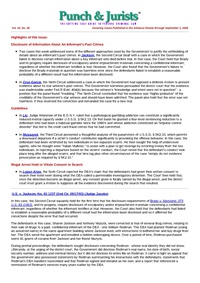Alex Mussayek emigrated from Israel to the United States in 1979. He settled in Brooklyn with his family, and established himself as the owner of a small flower and candy business. Over the course of several years, he was apparently victimized by two individuals, Ike Fogel and Philip Ben …
In this case, the Ninth Circuit sharply criticized both the district court and the prosecutor for their roles in preventing the defense from presenting rebuttal evidence about the prosecution’s star witness’s prior crimes. The Court held that the excluded evidence was “highly probative”; it could “well have cast reasonable …
Here the Court reversed a suppression order that had been granted, holding that an anonymous hacker who gained access to the defendant's computer and gave evidence to the FBI was not acting as a government agent.
The defendant in this case was indicted for manufacturing child pornography and …
This decision is certain to start a stampede of motions for downward departures based on claims of the defendant’s “pathological gambling addiction.” In his own inimitable style, Judge Weinstein started this noteworthy opinion with these words:
“The State encourages people to gamble, using Madison Avenue advertising techniques to induce …
Here the Court affirmed a suppression order, holding that the seizure in question was an arrest without probable cause, not an investigatory detention, and as such suppression of the evidence seized was mandated by the exclusionary rule.
This decision is noted as an excellent reminder of some of …
In this case, the Second Circuit squarely held for the first time that the disclosure requirements of Brady v. Maryland, 373 U.S. 83 (1963), and its progeny, require disclosure of exculpatory and/or impeachment materials concerning a confidential informant, regardless of whether the informant testifies at trial. However, the Court …
